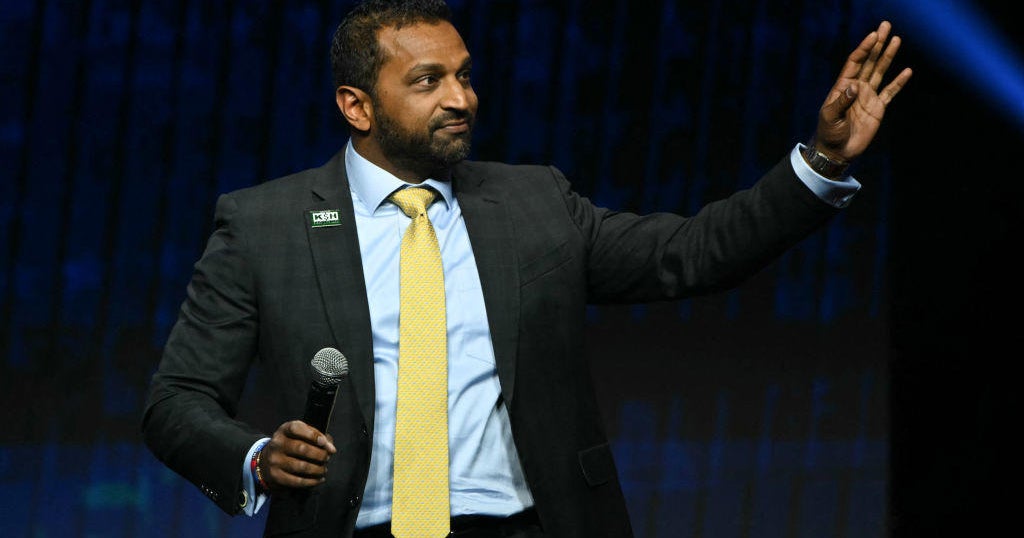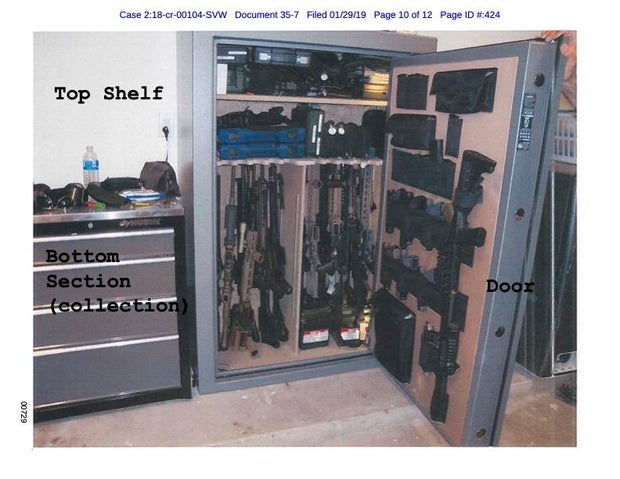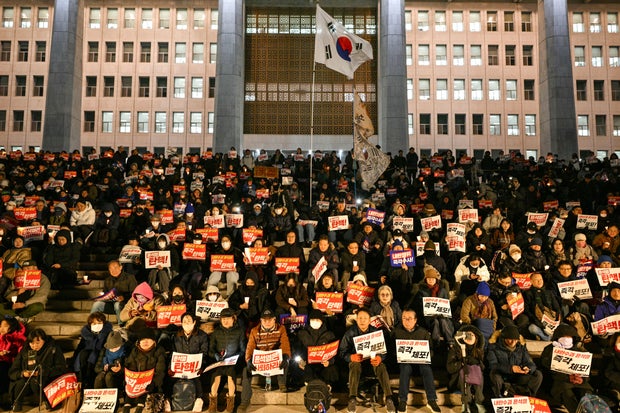CBS News
Trump cites Hunter Biden pardon in motion to dismiss New York criminal case
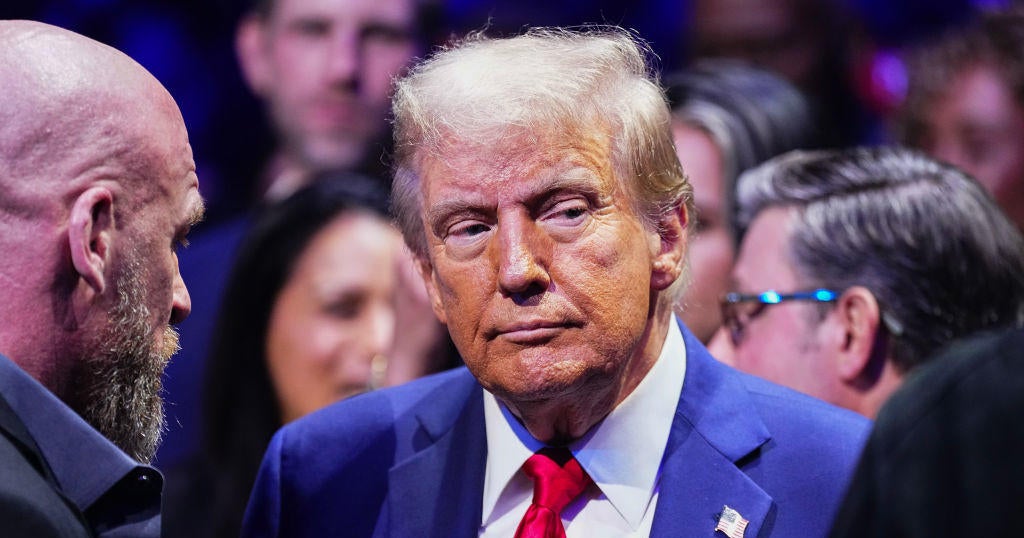
Donald Trump’s lawyers pointed to an unlikely person in demanding a judge dismiss the president-elect’s New York criminal case: Hunter Biden.
Trump’s attorneys said in a court filing made public Tuesday that President Biden’s controversial pardon of his son echoed Trump’s complaints about the prosecution.
“Yesterday, in issuing a 10-year pardon to Hunter Biden that covers any and all crimes whether charged or uncharged, President Biden asserted that his son was ‘selectively, and unfairly, prosecuted,’ and ‘treated differently,'” they wrote, before claiming Trump was treated similarly.
In the filing, which was submitted Monday night, they formally demanded a New York judge throw out the president-elect’s criminal case and nullify a unanimous jury’s conclusion that Trump committed dozens of felonies.
Their argument struck at the quality of the case against Trump, but focused largely on a wholly unique argument in the history of America’s legal system. Trump’s lawyers said his conviction in state court should not stand, citing as their sole reason the fact that he was elected president after his conviction.
Prosecutors for Manhattan District Attorney Alvin Bragg have vowed to oppose the dismissal motion, and have been given a one-week deadline to file their response. They pursued the case amid a torrent of public threats of retribution by Trump’s allies, and anonymous threats of violence by his supporters
Trump’s lawyers argued in their filing that the Constitution requires dismissal of the case, even though it’s already progressed though trial, because ongoing proceedings threaten to take Trump’s attention from the presidency.
This is a developing story and will be updated.
CBS News
Police illegally sell restricted weapons supplying crime
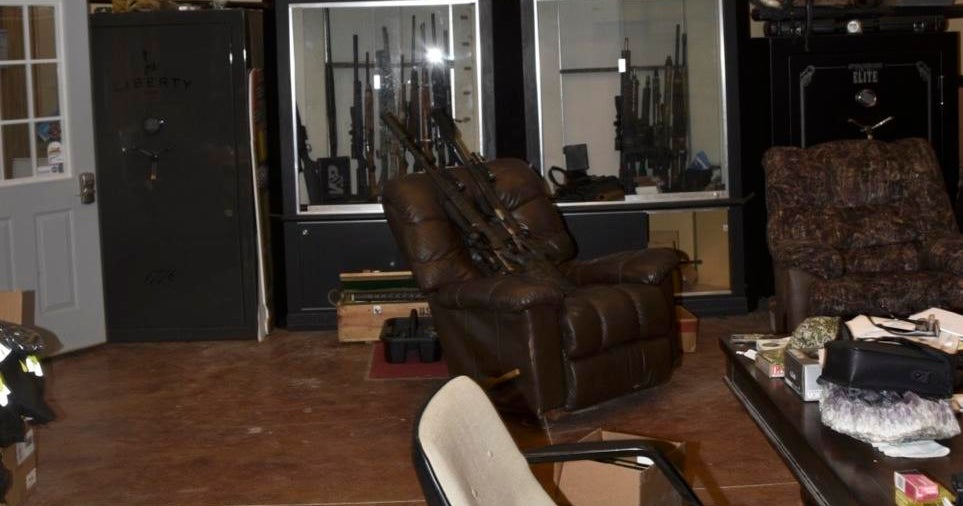
Adair, Iowa, had a population of 794. So, it seemed suspicious when its three-person police department asked regulators to buy 90 machine guns, including an M134 Gatling-style minigun capable of shooting up to 6,000 rounds of ammunition every minute.
Federal agents later discovered Adair’s police chief, Bradley Wendt, was using his position to acquire weapons and sell them for personal profit. A jury convicted Wendt earlier this year of conspiracy to defraud the United States, lying to federal law enforcement and illegal possession of a machine gun. Wendt is unapologetic and has appealed his conviction.
“If I’m guilty of this, every cop in the nation’s going to jail,” Wendt told CBS News just days before a federal judge sentenced him to a 5-year prison term. Wendt’s crimes appear to be part of a nationwide pattern.
U.S. District Court, Southern District of Iowa
A CBS News investigation found dozens of law enforcement leaders — sheriffs, captains, lieutenants, chiefs of police — buying and illegally selling firearms, even weapons of war, across 23 U.S. states, Puerto Rico and Washington, D.C., from the Deep South to the Midwest, Northeast and California coast.
A nationwide review of government audits and court records over the last 20 years uncovered at least 50 cases of police illegally selling their weapons online, through dealers, out of their homes or the back of their cars. In many cases, the weapons were sold to gun enthusiasts, often at steep markups as high as 10 times what they were bought for.
In several cases, the guns wound up in the hands of violent felons and were used to commit crimes including drug trafficking, international arms dealing and, in one case, the fatal shooting of a 14-year-old boy attending a high school football game.
In 2011, federal agents busted a smuggling ring out of New Mexico involving a police chief, mayor and village trustee who delivered automatic firepower and tactical gear to a Mexican cartel.
A decade later, prosecutors uncovered a multistate conspiracy linking a sanctioned Russian arms dealer with three police chiefs, one sheriff and a Delta Force veteran who sold machine guns directly to a criminal trafficker. All of them pleaded guilty. An additional alleged co-conspirator, who worked as an intelligence analyst for the U.S. Department of Homeland Security, denied wrongdoing and his case is proceeding to trial.
Nearly 26,000 guns were traced from American crime scenes back to a government agency, law enforcement or the military between 2017 and 2021, the most recently available data, according to a report by the Bureau of Alcohol, Tobacco, Firearms and Explosives. It isn’t known how many of those were lost, stolen or sold. However, when government auditors investigated firearms that law enforcement agencies reported missing over a 15-year period, the General Services Administration Inspector General found that more than two-thirds had not gone missing at all but, rather, were inappropriately sold or traded —including Uzis and grenade launchers that were never recovered.
Meanwhile, a separate Government Accountability Office audit in 2018 found $100 million worth of guns and ammunition bought by U.S. Immigration and Customs Enforcement was unaccounted for. In response, ICE said that it improved how it would keep track of its inventory going forward; there was no follow-up about the weapons that were already missing. ICE did not respond to CBS News’ request for comment.
Of the 58 cases CBS News identified where law enforcement officers were criminally charged with illegally selling their weapons, 56 of them either admitted guilt or were convicted; two have denied wrongdoing in ongoing cases.
Those cases are just the tip of the iceberg, according to interviews with half a dozen former Bureau of Alcohol, Tobacco and Firearms agents who worked directly on these investigations. Several career agents shared anecdotes about letting police departments off with warnings after repeatedly finding their service weapons in the hands of private citizens. The agents explained that prosecutors have been generally reluctant to charge these cases, and the bureau stated that “it is our goal to educate, not investigate,” according to a 2017 law enforcement memo obtained by CBS News.
“We’re not looking to prosecute fellow law enforcement officers,” said Eric Harden, former special agent in charge of the ATF’s Los Angeles field division.
Harden authored the 2017 memo, which flagged a “growing trend” of “officers purchasing and then selling [restricted] firearms…for profit.” The memo warned that anyone doing this was functionally acting as a straw purchaser in violation of at least two federal laws.
Harden told CBS News that if officers persisted after being warned, or if their weapons were traced to a crime, they should be held accountable. “If we don’t do this, then it’ll be turning a blind eye and saying officers are above the law.”
Harden wrote the memo after his intelligence unit traced an outlawed pistol seized in a narcotics bust to a recent purchase by a beat cop in Pasadena, California. Now retired, Harden still remembers that officer crying on his shoulder when federal agents showed up to arrest him for illegally selling more than 100 weapons out of his home. The officer argued at the time that he didn’t know he was breaking the law, but he later pleaded guilty. He served less than a year in federal prison and paid a $10,000 fine but was allowed to keep his Porsche and Alfa Romeo.
U.S. District Court, Central District of California
On the other side of LA County, a U.S. Customs and Border Protection officer, with secret-level security clearance, was operating an even more egregious gun-running scheme that went on for 20 years. He too eventually pleaded guilty, in 2019, after an undercover agent busted him selling weapons out of the trunk of his car. His stockpile at the time totaled more than 250 firearms, including 41 machine guns and two short-barreled rifles.
The officer “betrayed his oath to uphold the laws of the United States solely to put more money in his pocket,” the U.S. Attorney said in announcing the news of the officer’s prison sentence.
Several cases involved sheriffs and police leadership who used their positions in law enforcement to gain access to military-grade machine guns, short-barreled rifles and explosive devices like grenades, and then sold them in violation of federal law.
Although the Second Amendment guarantees the right to bear arms, there are limits to the kinds of weapons people are allowed to possess. Post-1986, these weapons — known to the ATF as Class 3/Title II and to the gun industry as “posties”— have been restricted for official government use because of their deadly firepower. Many of them are battlefield weapons used by U.S. and NATO forces in conflict zones. Some ammunition can take out a helicopter or blow straight through an armored tank followed by a concrete building, out the other side, then explode, hitting targets 18 football fields away. These guns can spew hundreds of rounds each minute, faster than the speed of sound.
“Congress knew almost 100 years ago, in the days of Al Capone, that fully automatic weapons were unusually dangerous,” ATF Director Steven Dettelbach said a public address on Feb. 28, 2023. “They have no place in our communities.”
The government loophole, however, has been exploited by opportunists who recruit law enforcement conspirators to help them bypass the American machine gun prohibition, according to law enforcement records and court filings obtained by CBS News that include text messages, videos and wiretapped audio conversations between people who were either convicted of or admitted participation in these schemes.
CBS News found a trail of activity in social media videos and online web forums frequented by firearm aficionados discussing how to entice law enforcement allies into this illicit trade, which can be highly lucrative. Amid a series of online conversations reviewed by CBS News, one poster suggested that after law enforcement acquired a $10,000 machine gun through the federal approval process, it could be worth $75,000 because it would be free of red tape. Wendt, the Iowa police chief, for example, at times earned more than a 90% profit margin, according to court records.
“Here is a breakdown of who signs for me,” advised another online user, identifying one police chief, one sheriff, one SWAT officer and one deputy sheriff with whom he said he attended high school.
For police departments to get ahold of such high-powered weaponry, each one needs permission from the ATF. Even though it has been the law for more than three decades, the ATF only started vetting every machine gun application for the first time in January 2023 to confirm that a legitimate government agency was making the request.
According to interviews with half a dozen longtime ATF officials who worked directly on these cases, the bureau typically does not assess the appropriateness of the weapons for a department or track where they end up.
“There’s no audits,” said former Supervisory Special Agent Tim Graden, who worked at the ATF for more than two decades before retiring in 2022. “There was no second-guessing whatsoever. They weren’t really — I don’t want to use the word concerned, but I can’t think of a better one.”
The Bureau of Alcohol, Tobacco, Firearms and Explosives declined requests to comment.
It’s unclear how pervasive this is nationwide, but in Iowa alone over the past five years, the ATF did not deny a single law enforcement request for machine guns “based on suitability (or lack thereof),” according to court filings. By 2023, there were more than 1,200 machine guns registered to law enforcement across the state.
To find out how that compares to other places, CBS News filed a series of Freedom of Information Act requests with the ATF for details about the high-powered arsenal it’s granted to public law enforcement over the past decade. However, the bureau denied those requests, stating that it considers that private tax information exempt from public disclosure. Last week, CBS News filed a lawsuit for the information.
The proliferation of this high-powered weaponry is likely to become increasingly more relevant when President-elect Donald Trump takes office. During his first administration, Trump revoked an Obama-era executive order restricting the transfer of military equipment from the Defense Department to law enforcement nationwide. The Trump transition team did not respond to a request for comment.
contributed to this report.
CBS News
South Korea martial law lifted, but democracy tarnished as President Yoon Suk Yeol faces likely impeachment
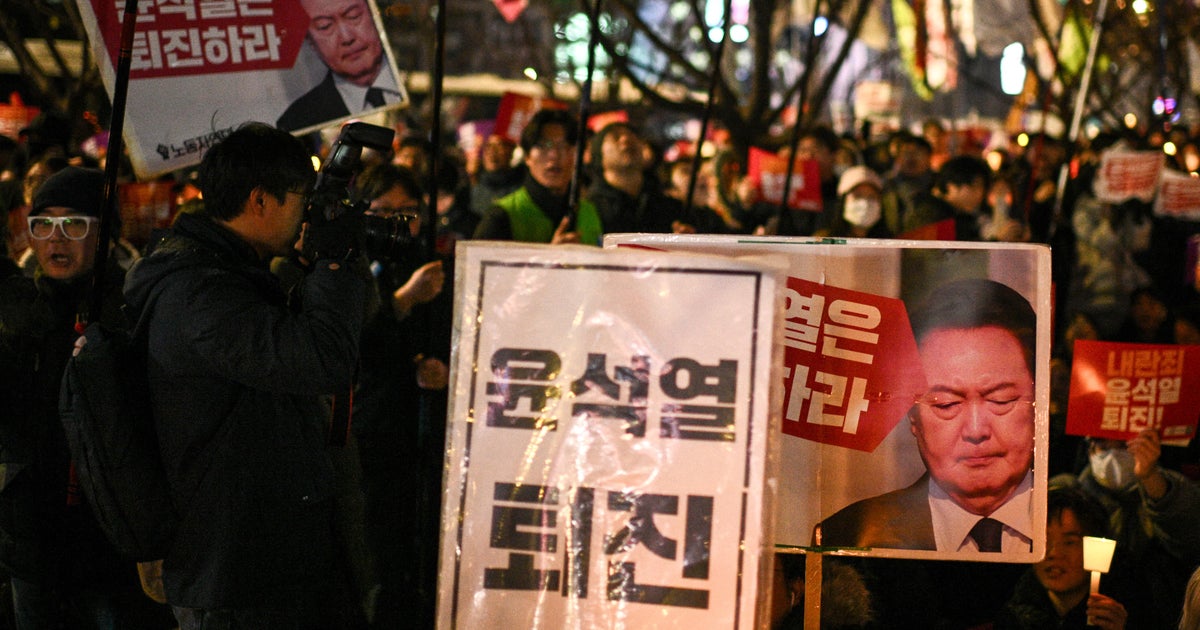
Seoul — South Korean President Yoon Suk Yeol seemed to treat a declaration of martial law as if it were a light switch, flipping it on at 11 p.m. Tuesday night, only to be unanimously rebuked in an emergency session of the country’s parliament just two hours later. It took him about three hours from that point to accept defeat and announce that he was lifting the martial law order.
The martial law declaration and revocation within six hours was the fiercest whiplash between military control and democracy that South Korea has endured since it became a democracy in 1987. It appears highly likely to bring a swift end to Yoon’s two-year tenure as the country’s elected leader.
The president’s gamble seemed rooted primarily in his own domestic political isolation and, while short-lived, it was sure to have major ramifications both for Yoon as a politician, and for South Korea as a nation.
ANTHONY WALLACE/AFP/Getty
Below is a look at what Yoon did, why he did it, and what it could mean for one of Asia’s most vibrant democracies and biggest economies.
What is martial law?
A declaration of martial law is typically used by political or military leaders in a country facing a purported immediate threat to stability or security. It is ostensibly intended to protect the rule of law and citizens by putting military forces in immediate control of a country, suspending the authority of a civilian government and legal system.
Yoon’s order immediately put South Korea’s military in charge of security across the country, froze virtually all existing laws and granted the forces extraordinary powers to detain people without charge and to censor the media.
There was no indication that South Korean troops took advantage of the powers granted to them during the six hours of martial law on Tuesday evening, though there were tense scuffles as forces blocked access to the parliament building and throngs of angry citizens turned up to protest Yoon’s sudden move.
Why did South Korea’s president impose martial law?
“I declared martial law at 11:00 last night with a firm will to save the country against anti-state forces that are trying to paralyze the essential functions of the state and destroy the constitutional order of liberal democracy,” Yoon told his nation in a televised address, claiming the declaration would protect south Korea from a “threat of the North Korean communist forces.”
But he never identified any specific military movements by the North, and his shock move appeared to have been directed more at what he called the “legislative dictatorship” of his own country’s opposition Democratic Party.
Yoon has seen his approval rating fall for several months, and with the opposition in control of the parliament for the last two years, he’s struggled to move forward any of his political objectives. He’s also faced criticism for dismissing multiple calls for independent investigations into financial scandals involving himself and his wife.
He complained Tuesday that the opposition had effectively left him unable to govern, including by proposing nearly two dozen impeachment motions against his conservative government and slashing his national budget by at least $700 billion dollars.
But despite Yoon’s political isolation and falling support among voters, few in the country anticipated a counterattack as dramatic as the declaration of martial law.
What will the martial law declaration mean for South Korea?
“Whichever way this shakes out, this is a major setback for what has been seen as a democratic stronghold in the Asia Pacific for the last 44 years,” said CBS News national security contributor Sam Vinograd, a former senior Homeland Security official.
“The overall perception of South Korea as a stable democracy has been tarnished at a time when an aggressive China and overall retrenchment from democracy globally are big concerns for U.S. national security,” said Vinograd, who’s now the geopolitical lead at the Brunswick Group think tank in Washington.
The White House, in a statement late Tuesday in Washington, expressed relief that Yoon had rescinded his martial law declaration.
“Democracy is at the foundation of the U.S.-ROK alliance, and we will continue to monitor the situation,” an administration spokesperson said, referring to South Korea by the initials of its official name, the Republic of Korea.
Washington has a deeply vested interest in stability in South Korea. About 28,500 U.S. troops are stationed in the country, largely to deter any aggression by nuclear-armed North Korea, but also as a deterrent against an increasingly assertive China.
South Korea’s capital Seoul lies just 30 miles south of the Demilitarized Zone — the no-man’s land created to separate the North and South when an armistice ended combat in the Korean War in 1953. The two countries technically remain at war as there was never a formal treaty, and tension between the Koreas has escalated in recent years, including under Yoon, who’s taken a harder line on the North than his predecessor.
“The Biden administration is going to be faced with some very difficult decisions about what to say and do,” said Vinograd. “South Korea is one of our closest allies, but this move seems to have come as a surprise to the White House.”
“South Korea is a strong balancing factor against North Korea and against communist China,” Vinograd said, adding that both the North and Moscow “are likely cheering the democratic upheaval in South Korea.”
“They see any signs of instability in South Korea as something that they can take advantage of… Without a vibrant democracy in South Korea, forces within China, within North Korea, will likely feel emboldened, and overall, democratic tendencies in the Asia Pacific will likely take a hit as well.”
Yoon faces calls to resign, threat of impeachment
Yoon looked increasingly likely to lose his job Wednesday after his seemingly dramatic miscalculation of political support.
The Democratic Party called quickly for Yoon to step down or face impeachment, and along with five smaller opposition parties, it submitted a bill in parliament Wednesday to impeach the president, with voting expected on the measure Friday or Saturday.
“It was clearly revealed to the entire nation that President Yoon could no longer run the country normally. He should step down,” senior Democratic Party lawmaker Park Chan-dae said in a statement, urging Yoon not to wait to be forced out.
South Korea’s parliament, the National Assembly, can impeach the president if over two-thirds of lawmakers vote in favor of the move. If it happens and he doesn’t resign first, South Korea’s constitutional court will then hold a trial to either confirm or deny the impeachment motion. Six of the nine justices on the court must back an impeachment for it to go ahead.
Yoon’s PPP holds 108 seats in the 300-member legislature, but even his own party appeared unlikely to back the embattled president too robustly. Its leader called Wednesday for the country’s defense minister to be sacked and the entire cabinet to resign, and the unanimous vote overruling his martial law declaration was a clear indication of the level of opposition to his conduct.
South Korean stocks tumble after martial law declaration
The streets of Seoul appeared largely normal Wednesday despite the overnight tumult. While police were out in force amid renewed protests against Yoon around the parliament, the usual morning rush hour traffic choked roads and railways.
More protests were expected, however, and South Korea’s biggest labor union coaltion, the Korean Confederation of Trade Unions, declared a nationwide strike and said it would hold a rally in the capital until Yoon left office.
The U.S. Embassy in Seoul urged American nationals in the city to avoid areas where protests were taking place, and some of the country’s biggest employers, including the LG Electronics brand, urged employees to work from home.
The unrest also took a toll on Asian stocks, with South Korean shares falling about 1.4% Wednesday and the country’s currency, the won, stable but still close to a two-year low against the dollar.
South Korean Finance Minister Choi Sang-mok and national bank governor Rhee Chang-yong gathered their deputies overnight for emergency meetings, and the finance ministry promised to take whatever measures were necessary to prop up falling share prices, according to the Reuters news agency.
Reuters said canned goods and staples such as instant noodles and bottled water flew off store shelves overnight as South Koreans feared a possible lingering political crisis.
“South Korea is no stranger to martial law,” Vinograd told CBS News, noting that the measure had been declared at least 15 times by various authoritarian regimes since the country’s founding in 1948.
“I’m deeply disturbed by this kind of situation,” Seoul resident Kim Byeong-In, 39, told Reuters overnight, “and I’m very concerned about the future of the country.”
contributed to this report.
CBS News
12/3: CBS Evening News – CBS News

Watch CBS News
Be the first to know
Get browser notifications for breaking news, live events, and exclusive reporting.


